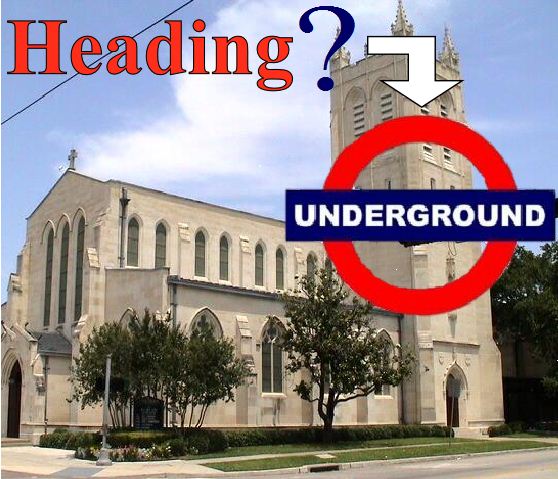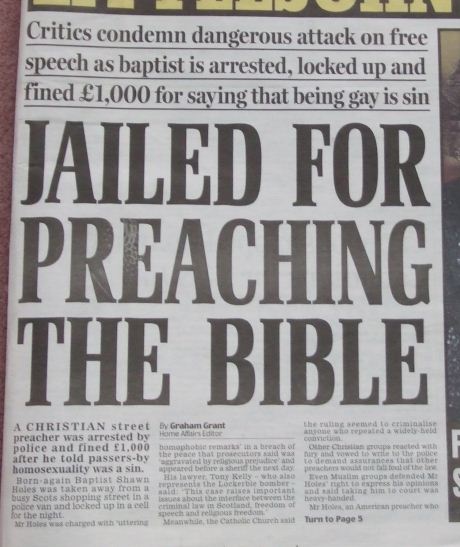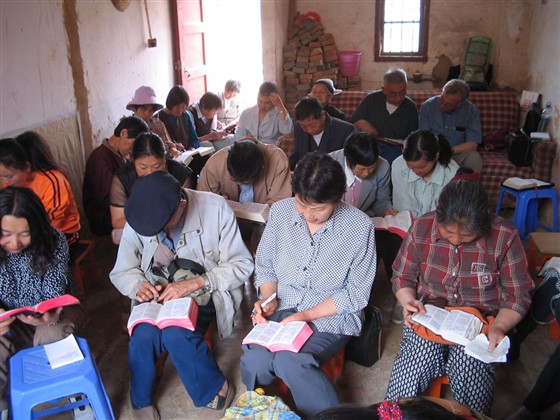Is the church heading underground?
With increasing pressures from politically-correct legislation and growing constraints on freedom of speech, how should Christians and churches respond; and what may be the outcomes?
first published 15/11/2011
 Within the last 5 years or so there has been a rapid rise in the cases of Christians facing attacks, legal challenges and persecution in the workplace. Believers have been forced out of business, suspended or removed from their jobs; and, in one recent case, disciplined severely through demotion and substantial reduction in salary for expressing a private opinion in a personal context. Within the last 5 years or so there has been a rapid rise in the cases of Christians facing attacks, legal challenges and persecution in the workplace. Believers have been forced out of business, suspended or removed from their jobs; and, in one recent case, disciplined severely through demotion and substantial reduction in salary for expressing a private opinion in a personal context.
Back in 2010 an American street preacher was charged and locked up in Glasgow and there are cases now of churches being very careful regarding the content of the sermons and teaching that they place on their websites.
A Scottish church leader was recently very nervous about a news report which would have shown that his congregation was meeting in a community school lest future access to the building be jeopardised.
 All of this is placing churches, those who lead them and those who attend them, into a position of having to choose how to respond. All of this is placing churches, those who lead them and those who attend them, into a position of having to choose how to respond.
Churches are becoming increasingly aware of anything that they might do or say which could land them on the wrong side of the law. And even if no civil law was broken or criminal offence committed there could be other sanctions brought to bear on churches which proclaim God’s word in its fullest form.
Local congregations which rent buildings Sunday by Sunday could find it difficult (or impossible even) to find premises to meet. As a very real threat to income, a church or Christian organisation could find its charitable status withdrawn and lose the ability to reclaim the tax paid by financial supporters.
Funding from local authorities and grant-awarding bodies may refuse to assist church schemes or place restrictive conditions on any awards. Existing funding could be withdrawn from Christian bodies which could have serious repercussions on how able that organisation or church is able to function.
 These scenarios are likely to produce two main responses. Some (many?) churches which are identifiable through their buildings, personnel, the taxation or banking systems, organisational structures and constitutional arrangements etc may decide to toe the line and modify (water-down) their messages accordingly. These scenarios are likely to produce two main responses. Some (many?) churches which are identifiable through their buildings, personnel, the taxation or banking systems, organisational structures and constitutional arrangements etc may decide to toe the line and modify (water-down) their messages accordingly.
Self-censorship?
They will increasingly be driven by fear of breaking the law or falling out with one or more of the various authorities at local and national level with whom they have to keep in with and do business. The results of which will be compromised churches, preachers and messages preaching politically-correct messages stripped of all the Gospel’s power and God-given authority.
An alternative model?
However others might respond differently and what we could see is the development – even rapidly perhaps – of the type of ‘underground’ church scenario which can be found in countries like China. These churches (in the form of informal groups of believers which no real structure or visible, identifiable routines and buildings , will operate in the same fashion as the ‘hidden army’ in Norway  which came into being when the armed forces in that country were overrun by the Nazis. which came into being when the armed forces in that country were overrun by the Nazis.
They will be necessarily wholly-dependant on the direction of the Holy Spirit in all that they will do. When and how to meet . How to ‘get the message’ out into the communities in which they are located and the world in which they live.
So in effect there will be a two-fold set up of ‘Christian’ churches. One grouping will be socially and politically acceptable with a gospel which is no Gospel at all: the other will be obliged to operate ‘below the radar’; always ‘on guard’ lest they are infiltrated, exposed or attacked. However these groupings will enjoy the blessing of God (Matt 5:11-12) and the encouragement and direction of the Holy Spirit (Luke 12:11-12) as they proclaim, in full measure, the Gospel of Jesus Christ (Matt 5:16).
Indeed in China this is what has happened since the ‘Cultural Revolution’ which brought fierce persecution down upon the Christian church. Today the ‘above ground’ churches are those which toe the party line.
 While today China's Constitution guarantees freedom of religion, Christians are nevertheless required to worship in ‘registered’ churches run by state-controlled organisations - the Three-Self Patriotic Movement for Protestants and the Chinese Patriotic Catholic Association for Catholics. While today China's Constitution guarantees freedom of religion, Christians are nevertheless required to worship in ‘registered’ churches run by state-controlled organisations - the Three-Self Patriotic Movement for Protestants and the Chinese Patriotic Catholic Association for Catholics.
However, more than 60 million Christians are believed to worship in unregistered (underground) "house" churches, compared to roughly 20 million in the state churches. The growth of house churches has accelerated in recent years, producing larger congregations that are far more conspicuous than the small groups of friends and neighbours that used to worship in private homes that gave the movement its name. The story of brother Yun and the has been written up (inter alia) in the book ‘The Heavenly Man’
Brother Yun
 Obeying a vision from the Lord to preach the gospel to the South and West, Yun left his home one day to travel to a town that had never heard the gospel. These people had heard how Yun had prayed to receive a Bible, and they were fasting and praying for him to come to their village. When Yun arrived, they all gathered around to hear him. He did not know how to preach, so he recited the whole book of Matthew for them. The Holy Spirit fell upon the people. They all knelt down and repented of their sins and received Jesus. These were the beginnings of the house church movement in China. God began to pour out His Spirit to the spiritually hungry Chinese people. Obeying a vision from the Lord to preach the gospel to the South and West, Yun left his home one day to travel to a town that had never heard the gospel. These people had heard how Yun had prayed to receive a Bible, and they were fasting and praying for him to come to their village. When Yun arrived, they all gathered around to hear him. He did not know how to preach, so he recited the whole book of Matthew for them. The Holy Spirit fell upon the people. They all knelt down and repented of their sins and received Jesus. These were the beginnings of the house church movement in China. God began to pour out His Spirit to the spiritually hungry Chinese people.
Brother Yun and his co-workers started a ministry of “fleeing evangelism”. Everywhere they went people were hungry to hear the gospel. They could not stay in one place for very long, however, because preaching the gospel in China was and still is illegal. In those days, the Word of God was very scarce. Amongst hundreds of church members, they only had one New Testament. None of the Chinese pastors that Brother Yun worked with went to seminary. There are no seminaries to be had in China.
In his 23 years of ministering in China, Brother Yun was arrested and sent to prison three different times. He spent a total of seven years in prison for the sake of the gospel of Jesus Christ.
Even today the Chinese authorities are arresting and imprisoning disciples in the belief that they are a threat to the state. In April this year Nearly 50 members of an underground Beijing church have been detained and its leaders have been put under house arrest as part of a crackdown on the unregistered congregation.
Decision time approaching?
So for Christian believers and their churches, decision-day may not be very far away. Compromise or hold fast. The extent to which any follower of Christ depends on the visible and identifiable components of organised religion may soon become very apparent. As the old maxim states: “Actions speak louder than words”. Jesus said ‘by their fruits you will know them’. |